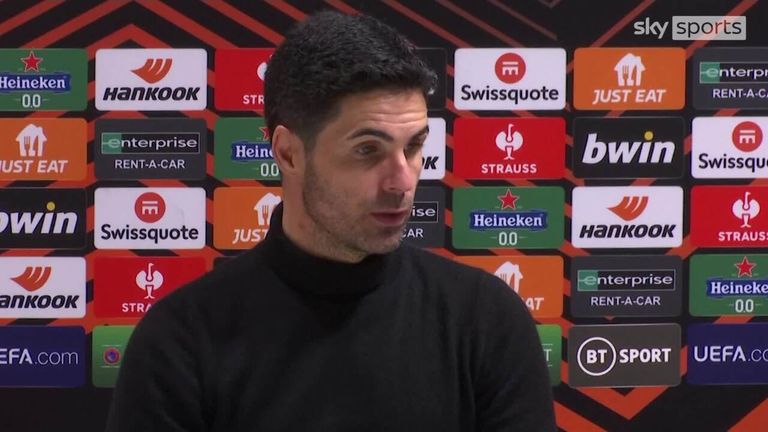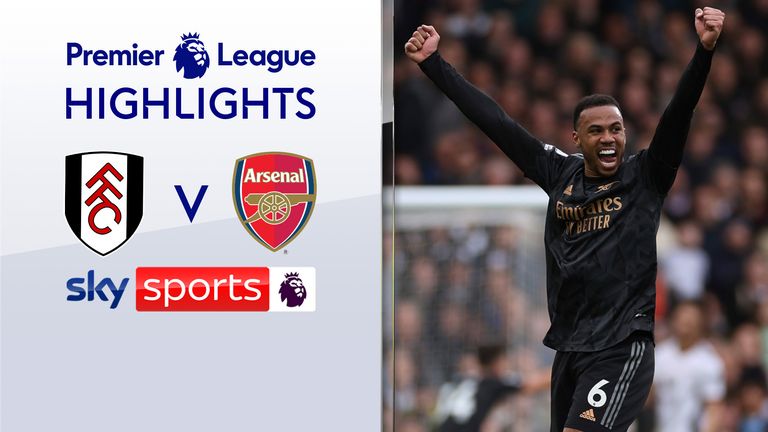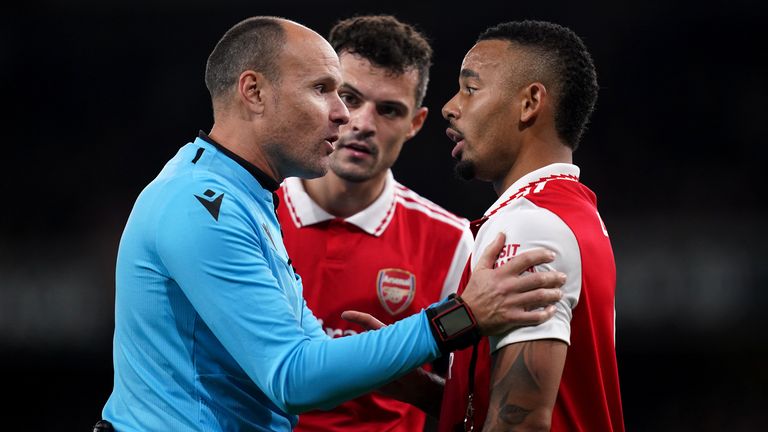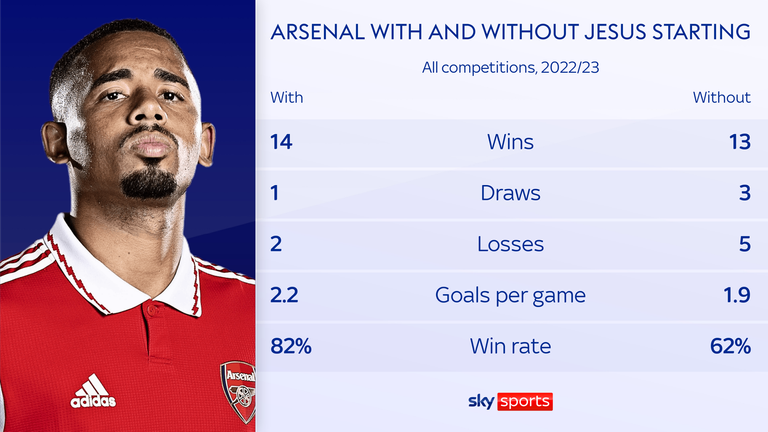The announcement of his name in Arsenal’s starting line-up was met with roars around the Emirates Stadium. Once the action got under way, it only took the ball going near him for a buzz of anticipation to go crackling through the stands.
The mood was of course different by the end. Arsenal’s Europa League exit, or, more specifically, the manner of it, on penalties to Sporting Lisbon after an arduous encounter in which they lost Takehiro Tomiyasu and William Saliba to injuries, was far from ideal.
But the return of Gabriel Jesus may prove pivotal in pushing them over the line in the Premier League title race. This was his first start for Arsenal since November following his return from a knee injury. His performance suggests he can hit the ground running.
The clues were there even in his brief substitute appearance in the win over Fulham four days earlier. Mikel Arteta had spoken of the Brazilian needing a “little bit more time” after his return to training but he looked like a man in a hurry at Craven Cottage.
That much was clear in the intensity of his display, pulling defenders out of position, dropping into midfield to link the play and tracking back diligently, at one point winning the ball off Fulham midfielder Harrison Reed near the Arsenal box.
At the same time, there was plenty of threat in the final third.
His cameo was only 13 minutes long but it included a cute reverse pass to put Reiss Nelson in on goal and a chance of his own, made possible by his clever flick for Fabio Vieira near the halfway line, which required a smart one-on-one save from Bernd Leno.
By the end, Premier League tracking data showed he had registered seven high-intensity sprints, a higher total than five of Arsenal’s 10 outfield starters managed and a measure of his determination to make things happen.
Arteta saw enough to use him from the start against Sporting and, while his participation was briefer than it might have been, the striker replaced by Leandro Trossard at half-time as Arsenal managed their changes following the enforced withdrawals of Tomiyasu and Saliba, his contribution was again encouraging.
As against Fulham, and as he did so effectively in the opening months of the season, Jesus could be seen popping up right across the front line, inter-changing positions with the team-mates around him and playing a central role in many of the hosts’ best moments.
On 16 minutes, a well-timed run at the back-post to meet a wicked Nelson cross which he couldn’t quite steer on target. On the half-hour mark, a slaloming dribble through a crowd of Sporting players followed by a low shot brilliantly saved by Adan.
Perhaps the best evidence of his impact, though, came in how Arsenal’s attacking treat dwindled following his withdrawal.
Trossard was outstanding against Fulham, setting up all three of Arsenal’s goals having started as the false nine, but Sporting’s defenders found him far easier to deal with than Jesus.
In fact, the hosts did not meaningfully threaten again until the second half of extra time, once Arteta had added Martin Odegaard to the fray and Sporting had begun to tire.
Jesus’ contribution was ultimately not the story of the night, the post-match fallout dominated by the deflating result and the injuries that could leave Arsenal light in defence, but it was a reminder, nonetheless, of his power to elevate the side.
His team-mates deserve immense credit for maintaining Arsenal’s position at the top of the Premier League table in his absence, but it was him, more than any other player, who put the wheels in motion for all that has followed at the start of the season.
In all competitions, Arsenal have emerged victorious from 14 of the 17 games Jesus has started, giving them a win rate of 82 per cent, compared to 62 per cent in the games he hasn’t.
Tomiyasu and Saliba’s injuries may now test Arsenal’s defensive depth but, at the other end of the pitch, if Jesus’ return is not tantalising enough in itself, it is made even more so by the number of attacking players with whom he can potentially combine.
Arteta talked of how Jesus had made Gabriel Martinelli and Bukayo Saka better in the first half of the campaign but now there is Trossard too, as well as a fit-again Emile Smith Rowe, a settled Vieira, plus Nelson, and another central striker in Eddie Nketiah who will be itching to get back to fitness.
Arteta described his selection headache at the top of the pitch as a “great problem” to have after the Fulham game and, without the fixtures a longer Europa League run would have brought, those players should all be fresh and firing for the 11 “finals” that remain, providing an array of options to unlock opposition defences.
So, with Jesus back at the heart of things, and with Arsenal’s focus narrowed to the competition that matters most as Manchester City continue to juggle their Champions League commitments, the hope for Arteta is that events at the Emirates Stadium on Thursday night, however painful, may ultimately prove beneficial.
Follow Arsenal vs Crystal Palace live on Sky Sports’ digital platforms on Sunday; kick-off 2pm; free highlights available shortly after full-time




